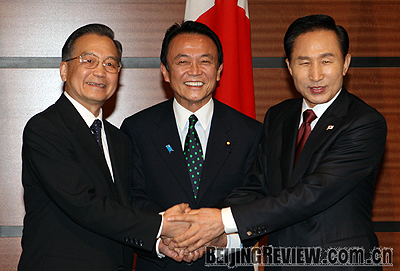|
|

TEAMWORK: Chinese Premier Wen Jiabao (left), Japanese Prime Minister Taro Aso (center) and South Korean President Lee Myung Bak in Fukuoka, Japan, after establishing a tripartite partnership at the first summit of the three countries on December 13 (YAO DAWEI) |
Judging by appearance alone, many people can hardly tell the difference between Chinese, Japanese and South Korean people. The three neighboring countries in Northeast Asia have also been influenced by the same cultural fountainhead of Confucianism. They have communicated with each other throughout history. Now a formal partnership will further boost their interaction.
On December 13, Chinese Premier Wen Jiabao, Japanese Prime Minister Taro Aso and South Korean President Lee Myung Bak gathered in Fukuoka, Japan, for their first tripartite summit, opening a new chapter in regional cooperation in Northeast Asia.
Summit achievements
During the one-day meeting, the leaders signed a joint statement establishing a tripartite partnership, a joint statement on enhancing cooperation in disaster management, a joint statement on international financial and economic issues, and an active plan to promote the tripartite cooperation. The three countries will hold trilateral summit meetings on a regular basis, with China hosting the meeting next year.
The tripartite meeting in Fukuoka "will pave the way for a new era of tripartite partnership that will lead to peace and sustainable development in the region," said the joint statement establishing the partnership. The leaders promised they would cooperate under the guiding principles of openness, transparency, mutual trust, common interest and respect for their diverse cultures.
According to the action plan, the three countries will strengthen cooperation in politics, economy, environmental protection, science and technology, social and cultural exchanges, and international issues such as climate change, nuclear proliferation, disarmament and UN reform.
Wen made six proposals on strengthening cooperation during the meeting, focusing on better communication of policies, solid trade and economic ties, strong financial cooperation, cooperation in social aspects, coordination in pushing forward sustainable development and exchange of views on regional issues.
The tripartite summit was of great historical significance, Feng Zhaokui, a researcher on Japanese studies at the Chinese Academy of Social Sciences (CASS), told Beijing Review.
He specified three reasons. First, the summit was the first one the three countries held outside the ASEAN 10+3 framework, which includes ASEAN, China, Japan and South Korea. Second, against the backdrop of the global financial crisis, regional cooperation is essential to address economic and financial challenges. Third, the three sides are putting aside their history of conflict in favor of regional cooperation, which is a positive attitude. "Solving historical problems is not the precondition for enhancing cooperation anymore," Feng said, "but enhancing cooperation will definitely help solve historical problems."
He explained that, unlike before the global financial crisis, the United States no longer objects to cooperation among China, Japan and South Korea. In the past, Washington worried that their cooperation might undermine the U.S. position in Northeast Asia. Now the United States believes that Northeast Asian cooperation would benefit the world by stabilizing the regional financial situation, he said.
Feng said that the tripartite meeting mechanism would not replace the existing ASEAN 10+3, adding that the contributions ASEAN has made to regional cooperation are irreplaceable. "East Asian regional cooperation can be divided into two plates," he said, ASEAN cooperation and cooperation among the three Northeast Asian countries. In addition, the three 10+1 meetings, which include ASEAN and one of the three Asian countries, can be regarded as three lines. Now the two plates and three lines have woven a complete network for regional cooperation in East Asia. "For East Asia, two engines of economic development are certainly better than one," Feng said.
According to the newly signed statements, the tripartite mechanism will contribute to advancing wider regional cooperation frameworks such as ASEAN+3, the East Asia Summit, the ASEAN Regional Forum and Asia-Pacific Economic Cooperation.
Focus of regional cooperation
The summit spotlight was on practical measures to enhance regional cooperation in various aspects.
|
